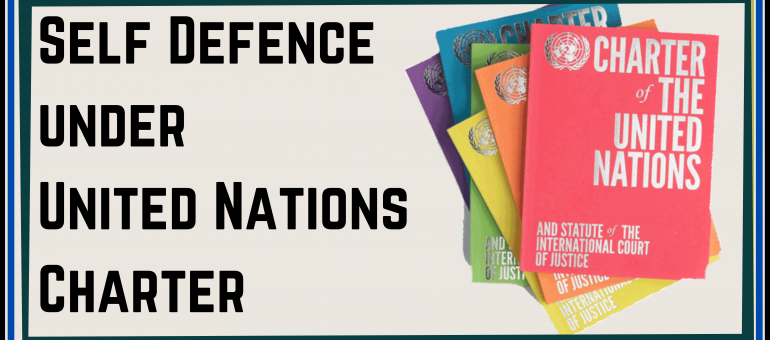Self Defence under United Nations Charter
The coming into force of the Charter of United Nations has brought about revolutionary changes regarding the valid grounds of intervention. Most of the traditional grounds have been ceased to be valid. The charter has, however, introduced a new ground, namely collective measures or collective Intervention founded on the concept of Collective Security. A critical discussion on the following grounds is being undertaken with a view to see which of these grounds are to be valid:
- Self-defence
- On humanitarian grounds
- To enforce treaty rights
- Intervention to prevent illegal intervention
- Balance of power
- For the protection of persons and their property
- Collective intervention
- Intervention to maintain International law
- Intervention in civil wars
Self-defence:
it has been the valid ground of intervention for a long time. On the ground of self-defence, a state may intervene in the affairs of another State. In this connection Mr Websiter, the Secretary of the United States of America propounded a very important principle in the famous case named as Caroline. This principle was affirmed by the Nuremberg Tribunal in 1946. The test laid down in the Caroline was finally affirmed by the International Court of Justice in the Corfu Channel Case.
The facts of the Caroline Case:
In Canada, which was then the colony of Britain, some revoluntaries were trying to overthrow the government. The ship named Caroline was carrying arms and men from across the river Niagara to assist the rebels. The British Government lodged a protest against the American Government but with no effect. The British soldiers crossed the river, seized the ship in the American territory and left it floating. The American Government protested and asked the British Government to justify its action on the ground of self-defence and self-preservation. The American Secretary of State Mr Websiter propounded the above-mentioned test. England failed to justify its action on the basis of this test and had to express regrets.
In another case of Corfu Channel case, Albania and Britain entered into a special agreement and through this agreement referred the following two questions for adjudication of the Court;
- Was Albania liable under International law for explosions in its maritime belt and if the answer is yes whether; Albania is liable to pay damages for the same?
- Whether Britain violated the Sovereignty of Albania by removing the explosive substance, mines, etc from the territorial waters of Albania?
The International Court of Justice answered the question first in favour of Britain. That is to say, the Court decided that Albania was responsible for explosions in its territorial water. The court answered the question second in favour of Albania. That is to say, Britain violated the sovereignty of Albania by removing the explosive substances from the territorial waters of Albania without our permission. The court observed that Albania was under an obligation to inform Britain about the mines and explosives substance in the North Channel. Albania did not give any such Endeavour was made by Albania as might prevent the harm caused to the warships of Britain. The Court, therefore, ruled that Albania was liable for the loss and damage caused to the British warships on account of explosives and was liable to pay compensations to Britain. But, by removing the mines etc from the territorial water of Albania without its permission, Britain was guilty of the violations of Albania sovereignty. However, in view of the gravity of Albania act of firing on British ships the world court did not award any compensation on this account. The test propounded by Mr Websiter is valid with the only difference that intervention on the ground of self-preservation is no more allowed. Thus instead of self-defence and self-preservation the valid ground now is only self-defence, that too very much limited and curtailed by the Article 51 of the Charter of the U.N. However, the concept of self-defence as expounded under Article 51 includes the defence of others and is called the right of individual and collective self-defence.
Conclusion:
The United Nations Charter enshrines the principle of individual and collective self-defence in Article 51. The right of self-defence under article 51 is subject to the following conditions:
- There should be an armed attack
- The right exists until Security Council has taken any action
- It should be reported to the Security Council
- It is subject to the review by Security Council
- This right shall not affect the responsibility of the Security Council for the maintenance of peace and security
- The right is not available against a non-member of the United Nations.
GLIMPSE OF RESEARCH METHODOLOGY

